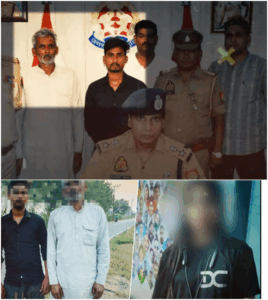Muzaffarnagar Horror: Father and Brother Strangle Daughter, Burn Body to Preserve ‘False Honor’
Muzaffarnagar Honor Killing: Father and Brother Kill Daughter, Burn Her Body to Protect ‘Family Reputation’
In a shocking and heart-wrenching case of honor killing, a 23-year-old woman named Saraswati from the Katia village in Muzaffarnagar, Uttar Pradesh, was brutally murdered by her own father and brother. Driven by the toxic concept of “family honor,” the duo strangled her to death, burned her body with petrol, and dumped it in a nearby forest to ensure her identity would remain unrecognizable. This horrifying act has sent shockwaves across the region and reignited debates about the deeply entrenched patriarchal values that continue to plague Indian society.
.
.
.

The Discovery of a Burnt Body
On June 3, 2025, the local police in the Kakrauli area of Muzaffarnagar received reports of a burnt body found in the forests near Katia village. The charred remains were discovered by locals, who immediately informed the authorities. Upon arrival, the police found the body completely burned, making identification almost impossible. However, during the investigation, they noticed a metal bangle (kada) on the victim’s wrist, which eventually became the key to identifying the deceased.
The police launched an extensive investigation, utilizing social media platforms like Instagram and other digital tools to trace the identity of the victim. After days of effort, they confirmed that the body belonged to Saraswati, a 23-year-old resident of Katia village. Her family was summoned for questioning, and what unfolded from their confession left everyone horrified.
The Motive Behind the Murder
According to police reports, Saraswati’s father, Rajveer, and her brother, Sumit, confessed to the crime during interrogation. They revealed that Saraswati’s behavior had brought “shame” to the family in their eyes. Saraswati had been married twice, but both marriages ended in separation. After returning to her parents’ home, she began living with her boyfriend, which became a subject of gossip in the village. Her relationships with multiple men and her refusal to conform to societal expectations of a “respectable woman” enraged her father and brother, who felt that their family’s reputation had been tarnished.
Unable to bear the perceived humiliation, Rajveer and Sumit decided to take matters into their own hands. On the night of May 30, they executed their plan in cold blood.
The Gruesome Crime
On the fateful night, Rajveer and Sumit confronted Saraswati about her relationships and accused her of bringing dishonor to the family. When she refused to comply with their demands to end her relationship, they attacked her. The father and son duo strangled her to death, ensuring there was no chance of survival. After committing the murder, they devised a plan to dispose of her body in a way that would erase all traces of her identity.
The two men carried Saraswati’s lifeless body to their vehicle—a small goods carrier used for transporting items. They drove to a secluded forest area near the village, where they poured petrol extracted from a moped onto her body and set it on fire. The flames consumed most of her body, leaving it unrecognizable. They then abandoned the charred remains in the forest, believing their crime would never be uncovered.
The Investigation and Arrest
When the burnt body was discovered on June 3, the police began a thorough investigation. The identification process took several days due to the state of the remains. However, the kada on Saraswati’s wrist provided a vital clue. The police cross-referenced social media profiles and local records, eventually identifying Saraswati as the victim.
Following this breakthrough, the police questioned her family members, who initially denied any involvement. However, under sustained interrogation, Rajveer and Sumit broke down and confessed to the crime. They admitted to killing Saraswati to protect their “honor” and detailed the entire sequence of events leading up to the murder.
The police arrested Rajveer and Sumit and charged them under sections 302 (murder), 201 (causing the disappearance of evidence), and other relevant sections of the Indian Penal Code. Another accomplice, Gurudayal, who allegedly helped them in the crime, is currently on the run. Efforts are underway to apprehend him.
A Community Divided
The incident has left the local community divided. While many have condemned the brutal act, there are still those who believe that Saraswati’s actions justified the punishment meted out by her family. This toxic mindset, rooted in patriarchal values and the obsession with family honor, continues to perpetuate such heinous crimes in rural and semi-urban parts of India.
Neighbors and villagers expressed mixed reactions. Some described Saraswati as a “rebellious” girl who defied societal norms, while others mourned her tragic death and criticized her family’s actions. A local resident remarked, “No matter what she did, no one has the right to take someone’s life. This is not honor; this is pure evil.”
The Broader Issue of Honor Killings
Saraswati’s murder is not an isolated incident. Honor killings remain a grim reality in many parts of India, where patriarchal norms dictate the behavior of women and punish those who dare to challenge them. According to data from the National Crime Records Bureau (NCRB), hundreds of honor killings are reported each year, though many cases go unreported due to societal pressure and fear of retribution.
The concept of “honor” is often tied to a family’s control over the actions of its women, particularly in matters of love, relationships, and marriage. Women who choose their own partners, marry outside their caste or religion, or engage in relationships deemed inappropriate by their families are often subjected to violence, ostracization, or even death.
The Role of Law Enforcement and Society
While the police in this case acted swiftly to identify the victim and apprehend the culprits, the incident raises questions about the role of society in enabling such crimes. The stigma surrounding women’s independence and the pressure to conform to traditional norms create an environment where honor killings are seen as a way to “restore” family pride.
Activists and human rights organizations have called for stricter laws and better enforcement to prevent honor killings. They emphasize the need for education and awareness campaigns to challenge the regressive attitudes that fuel such crimes.
Play video:
A Tragic End
Saraswati’s death is a stark reminder of the cost of societal expectations and the dangers of placing family honor above human life. Her story has sparked outrage and grief, but it also highlights the urgent need for change. Until society learns to value individual freedom and dignity over outdated notions of honor, such tragedies will continue to occur.
As Saraswati’s father and brother await trial, the community and the nation must reflect on the deep-seated issues that led to this horrific crime. Saraswati’s life was cut short by those who should have protected her, and her death stands as a grim testament to the violence that patriarchy and misplaced notions of honor can unleash.
News
Missing PG Student Monica from Darbhanga CM College Found in Shocking Condition—Police Stunned
Missing Darbhanga CM College Student Monica Found Safe—Reveals She Left Home Willingly to Marry A week-long mystery surrounding the disappearance…
Chaos on the Kanwar Yatra: Devotees Go on Rampage, Vandalize Dhaba from Muzaffarnagar to Roorkee!
Kanwar Yatra Turns Violent: Kanwariyas Vandalize Dhabas from Muzaffarnagar to Roorkee Over Onion in Food A shocking wave of violence…
Uproar After Samajwadi Party Leader Sunil Yadav’s Death: Ex-MLA and Brother-in-Law Named in FIR!
Uproar in Sultanpur After Samajwadi Party Leader Sunil Yadav’s Mysterious Death: Former MLA and Brother-in-Law Named in FIR A wave…
Shocking Viral Video: Teacher Beats Student with Stick in Bihar School—Discipline or Violence?
Bihar School Turns Battleground: Viral Video Shows Teacher Beaten Brutally by Angry Parents—Discipline or Violence? A shocking video has taken…
Forced to Strip at Knifepoint: Obscenity in the Name of Jobs—What’s Happening in Uttar Pradesh?
Job Promise Turns Nightmare: Woman Forced to Undress at Knifepoint in Uttar Pradesh Official’s Quarters Uttar Pradesh: A shocking video…
UP Education Minister Injured in Road Accident as Convoy Cars Collide
UP Education Minister Gulab Devi Injured in Road Accident as Convoy Cars Collide Hapur, Uttar Pradesh: Uttar Pradesh’s Education Minister,…
End of content
No more pages to load












